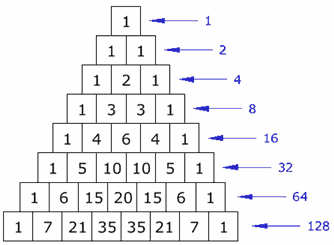Binomial
- The sum of the numerical coefficients in the expansion of the binomial ( a + b ) 6 is
The answer is 64.
This section requires Javascript.
You are seeing this because something didn't load right. We suggest you, (a) try
refreshing the page, (b) enabling javascript if it is disabled on your browser and,
finally, (c)
loading the
non-javascript version of this page
. We're sorry about the hassle.
10 solutions
nCr nC0 + nC1+ nC2 +......+ nCn = 2^n
@Ashtik Mahapatra Why did you write (a+b^6)? It looks like a + b 6 . I was absolutely sure that it is ( a + b ) 6 & I didn't go wrong. Edit the question immediately .
Well, we solve it using Pascal's Triangle . Make the triangle until its first six levels & add the sixth row which is
1 + 6 + 1 5 + 2 0 + 1 5 + 6 + 1 = 6 4 .
That's unnecessary.It is known that the sum of the binomial coefficients
( 0 n ) + ( 1 n ) + . . . + ( n n ) = 2 n .
In this case n=6, so our answer is 2 6 = 6 4
Log in to reply
@Bogdan Simeonov Pascal's Triangle is based on this very principle!
Log in to reply
Yes, I know that, but why did you sum them?You could have just said 2 6 and that's it.
@Ameya Salankar I am very sorry for this mistake. In fact I had not checked the question. I have edited it. Thanks for letting me know
I am happy to see that you didn't go wrong for my mistake, otherwise I would have felt too guilty. Actually for these small mistakes in the questions we get it wrong and our ratings drop.
Log in to reply
@Ashtik Mahapatra Notice that ratings drop on problems which are rated by moderators . Your problem was not rated by moderators so the ratings wouldn't have dropped. Anyway, you could have used L A T E X though.
Log in to reply
Sorry but I don't., know how to use LATEX
Log in to reply
@Ashtik Mahapatra – @Ashtik Mahapatra You can make this site a bookmark. Without L A T E X , you miss out on half the fun on Brilliant!
Use the pascal's triangle: { Sixth row }

Solve it using pascals triangle
1
1 1 -> (a+b)¹
1 2 1 -> (a+b)²
1 3 3 1..so on........
For (a+b)^6 ... The nos are
1 6 15 20 15 6 1... Sum of which is 64
there is a short-cut method for finding the sum of co-efficients in binomial... we can find it by putting all variables=1... so(a+b)^6 = (2)^6 = 64
by the law of pascel 1 1 2 1 1 3 3 1 1 4 6 4 1 1 5 10 10 5 1 1 6 15 20 15 6 1 so (1+6+15+20+15+6+1)=64
Use of the Pascal's Triangle helps to cap off.
Does "cap off" mean the same as "hats off"?
Draw a pascal's Triangle and add all the numbers of line 6...Simplest way to do it..
Note that in expanding ( a + b ) 6 , we have:
( a + b ) 6 = a 6 + 6 C 1 a 5 ⋅ b + 6 C 2 a 4 ⋅ b 2 + 6 C 3 a 3 ⋅ b 3 + 6 C 4 a 2 ⋅ b 4 + 6 C 5 a ⋅ b 5 + b 6 .
And if we let a = b = 1 we are left with the coefficient on the right side of the equation. That is we have:
1 6 + 6 C 1 1 5 ⋅ 1 + 6 C 2 1 4 ⋅ 1 2 + 6 C 3 1 3 ⋅ 1 3 + 6 C 4 1 2 ⋅ 1 4 + 6 C 5 1 ⋅ 1 5 + 1 6
= 1 + 6 C 1 + 6 C 2 + 6 C 3 + 6 C 4 + 6 C 5 + 1
= 1 + 6 + 1 5 + 2 0 + 1 5 + 6 + 1 = 6 4
Since we let a = b = 1 , the left side of the expansion ( a + b ) 6 becomes ( 1 + 1 ) 6 = 2 6 = 6 4
We can actually extend this.
For example, we wish to determine the sum of the coefficient of the binomial expansion ( a + b ) n , where n ∈ N , then the coefficient can be computed by letting a = b = 1 . That is, the sum of the numerical coefficient will be 2 n
We can still extend this. What if we have numerical coefficient in the binomial.
For example, what is the sum of the numerical coefficient of ( 2 a + 3 b ) 2 ?
Since ( 2 a + 3 b ) 2 = ( 2 a ) 2 + 2 ( 2 a ) ( 3 b ) + ( 3 b ) 2 = 4 a 2 + 1 2 a b + 9 b 2 . We can easily see that the sum of the coefficient is 4 + 1 2 + 9 = 2 5 .
However, if we let a = b = 1 we get ( 2 + 3 ) 2 = 5 2 = 2 5 which is our answer.
Now let us try finding the sum of the coefficient of ( 2 a − 3 b ) 4 . You can check that the answer is 1 .
Let S be the Sum of Coefficients
S=(coef. of A + coef. B)^n
S=(1+1)^6
S= 2^6
S=64